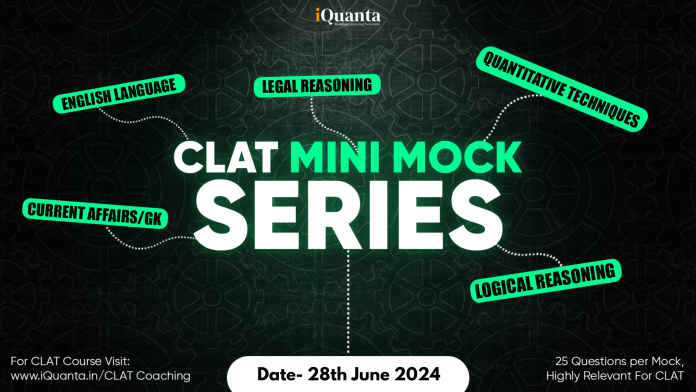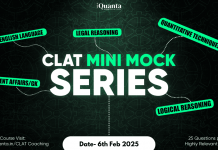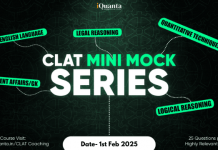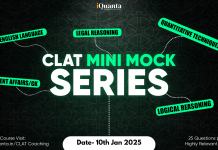iQuanta has launched a Mini Mock Series covering all the sections of the CLAT exam, these questions have been handpicked by our faculty based on the latest CLAT exam pattern.
Instructions:-
1. Attempt all the questions.
2. Once you have completed all the questions of a particular section click on the submit button for scores and explanations then move to the next sections.
3. For each correct answer, you receive 1 mark. For this mock, there is no negative marking.
English Language
Directions: Read the passage and answer the following question.
The prime minister’s cabinet met at 6 a.m. on 26 June. None of her senior ministers knew of the proclamation in advance, but the cabinet quickly and dutifully approved the decision. The Emergency Order had already removed protections of rights to freedom under Article 19 of the Constitution. The president signed another proclamation under Article 359 on 27 June, suspending the right to move any court to enforce rights under Articles 14, 21 and 22. The next day, Fali S. Nariman, one of India’s top law officers, dispatched a one-line letter of resignation as additional attorney-general in protest.
H. V. Kamath, among others, had warned against this Emergency provision in the Constituent Assembly, citing the cautionary example of Hitler’s abuse of Article 48 of the Weimar Constitution. Agamben [the renowned Italian philosopher] also mentions this example as part of a rising trend since World War I in the United States, France, Britain, Italy and Switzerland to invoke emergency conditions to assume extraordinary powers, which were subsequently normalized as the paradigm of government. Kamath feared something of this kind. He argued that if India had survived the crises in Kashmir and Hyderabad without Emergency provisions, it could outlive future adversities too. But the leading drafters, including Ambedkar, were adamant that the security of the state required them to deal with extraordinary circumstances. They thought a powerful state was necessary to secure the nation’s integrity and transform its outmoded and unequal society. Their arguments won the day, and the Constituent Assembly adopted the Emergency provisions.
Twenty-five years later, Kamath’s warning came to pass. The Emergency proclamation signed by President Ahmed just before midnight on 25 June was announced within hours by the knocks on the doors of Indira’s political opponents. By the dawn of 26 June, Jayaprakash Narayan, Morarji Desai and over 600 opposition leaders and activists were behind bars. The government managed to cut off electricity to all but two newspapers in New Delhi on the night of 25 June to prevent them from reporting the predawn swoop. In any case, the arrests had occurred too late for the morning editions to carry the news. The government seized the supplements published by the Hindustan Times and Motherland on 26 June. The newspapers of 27 June reported the declaration of the Emergency, suspending fundamental rights under Article 19, and the arrest of JP and opposition leaders. They also reported on the unscheduled radio broadcast by the prime minister on the morning of 26 June, in which she justified the proclamation on the grounds of the threat to internal stability. She spoke about “the deep and widespread conspiracy” brewing against her progressive reforms and agitations threatening law and order and normal functioning.
[Extracted with edits from Emergency Chronicles: Indira Gandhi and Democracy’s Turning Point by Gyan Prakash, published by Penguin Random House India]
Current Affairs and General Knowledge
Directions: Read the passage and answer the following question.
Households across the country’s rural and urban areas spent the highest share of consumption expenditure on ‘beverages, refreshments and processed food’ among food items in 2022-23, but some states bucked the trend in favour of other items — ‘milk and milk products’, and ‘egg, fish & meat’.
In rural areas among all major states, the households of Haryana spent the maximum on ‘milk and milk products’ at 41.7 per cent as a percentage of total expenditure on food, while Kerala spent the most on ‘egg, fish & meat’ at 23.5 per cent, detailed report of Household Consumption Expenditure Survey (HCES) 2022-23 released by Ministry of Statistics and Programme Implementation (MoSPI) on Friday showed.
Legal Reasoning
Directions: Read the passage and answer the following question.
Fraud implies and involves any of the following acts committed by a contracting party or his connivance or his agent with the intention of deceiving or inciting another party or his agent to enter into the agreement.
• The suggestion, as a fact, of that which is not true by one who does not believe it to be true.
• The active concealment of a fact by one having knowledge or belief of the fact.
• A promise made without any intention of performing it.
• Any other act fitted to deceive.
• Any such act or omission as the law specially declares to be fraudulent.
Mere silence as to facts likely to affect the willingness of a person to enter into a contract is not fraud, unless the circumstance of the case is such that, regard being had to them, it is the duty of the person keeping silence to speak or unless his silence, in itself is, equivalent to speech.
Section 17 of the Contract Act describes fraud and lists the acts that amount to fraud, which are a false claim, active concealment, promise without the intention of carrying it out, any other deceptive act or any act declared fraudulent. To constitute fraud, the contracting party or any other individual with his connivance or his agent or to induce him to enter into the agreement, should have performed such acts.
The main difference between fraud and misrepresentation is that in the first case, the person making the suggestion does not believe it is true and in the other case, he believes it is true, although in both cases, it is a misrepresentation of fact that misleads the promisee. This was held in Rattan Lal Ahluwalia v Jai Janider Parshad. Under common law, fraud will not only render the contract voidable at the option of the party whose consent is so obtained, but will also give rise to an action for damages in respect of deceit. If a decree is found to have been obtained by fraud, an application moved, even belatedly, would be maintainable. Court has inherent jurisdiction to grant relief on such an application and even principles or res judicata would not apply.
[Extracted with edits and revision from Fraud in Contracts, blog by Ipleaders]
Logical Reasoning
Directions: Read the passage and answer the following question.
If a tree falls in the forest, and there’s no one around to hear it, does it make a sound? Well, if by ‘sound’ we mean vibrating air, then yes, when the tree falls, it vibrates the air around it. However, if by ‘sound’ we mean the conscious noise we hear when our sensory apparatus interacts with the vibrating air, then if no one is around to hear the tree when it falls, there’d be no sensory apparatus for the vibrating air to interact with, and thus no conscious noise would be heard. So, the answer to this age-old question seems to be simple: it depends on how we define ‘sound’. If we define it as ‘vibrating air’, the falling tree makes a sound. If we define it as a conscious experience, the lonesome falling tree does not make a sound. There, problem solved.
The point of asking this question, however, is not so that it can be answered quickly and put aside. Rather, its point is to draw out the rather strange tension between our two very different definitions of the word ‘sound’. On the one hand, we classify sound as a mechanistic process that exists without us, ‘out there’ in the world. On the other, we regard it as a private conscious experience, its existence entirely dependent on us. And when you dwell on this latter definition, you realize it doesn’t just extend to sounds. Everything we experience — everything we see, hear, smell, touch, taste — all of it depends on our sensory apparatus, on us. Without us, our experiences would not exist.
Take away our senses, and the world of our experience would be replaced by a colorless, soundless, odorless, tasteless nothingness. Without us, what remains? The reason our original question — When a tree falls in the forest, and there’s no one around to hear it, does it make a sound? — is such a teaser, is because it hits on a deeper question. Author’s reaction to this question might be, ‘of course it would’. But let’s think about it again: if there was nothing conscious, then nothing would be experienced. There would be nothing resembling anything we call ‘existence’. No colors, no sounds, no smells, no tastes, no touch, no sense of time, no sense of space. Reflecting on this strange state of affairs, numerous great thinkers have concluded that consciousness must be more fundamental than the ‘stuff’ that consciousness experiences.
Quantitative Techniques
Directions: Read the passage and answer the following question.
Read the table and answer the following questions:
A survey of film watching habits of people living in five cities P, Q, R, S and T is summarised below in a table. The column I in the table gives percentage of film-watcher in each city who see only one film a week. The column II gives the total number of film-watchers who see two or more films per week.
City I II
P 60 24,000
Q 20 30,000
R 85 24,000
S 55 27,000
T 75 80,000




